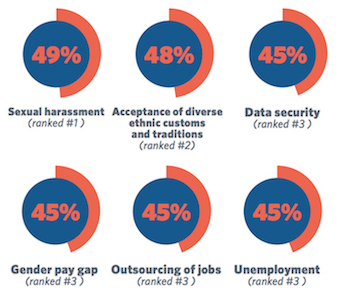Consumers are more informed and engaged than ever, and their purchasing decisions are influenced, in part, by the beliefs and tribal values reinforced by today's increasingly polarized media climate.
This phenomenon has put our corporate leaders in the political crosshairs, where a brand’s reputation is measured, to a degree, by the positions it takes on the social and political issues that matter most.
An October study released by FleishmanHillard gives some much-needed direction with regard to how companies might navigate today’s issues-charged environment, highlighting the social and political areas that currently carry the highest expectations for today’s corporate leaders to take a stand.
Nearly half of respondents — 47 percent — said they’re less likely to purchase from a company they believe behaves in a manner that conflicts with their personal values, according to the FleishmanHillard study.
Two-thirds — 66 percent — said they’ve already stopped using a company’s products or services because that company’s response to an issue didn’t comport with their own views.
|
|
On the other hand, a similar number — 61 percent — said they also think it’s important for companies to express their positions, even when those stances are at odds with the respondent’s point of view, and consumers value this autonomy so much that 43 percent said they’d be very likely or even extremely likely to continue supporting a company once it explained why it took that position, even in cases where the respondent disagrees.
Respondents were surveyed on 51 current issues spanning cultural, economic, political and societal interests. The top 10 issues consumers said they wanted companies to act on were: sexual harassment, ethnic diversity, data security, unemployment, impact of outsourcing jobs to other countries, the gender pay gap, acceptance of diverse religious beliefs, racism and data privacy.
These issues were cited for their importance across generational lines. Interestingly, however, the Silent Generation, or those over the age of 73, were the group that expected companies to take a stand on the most issues, beating out every other generation in terms of expressing the highest expectations in every category ranked. Baby Boomers particularly expected companies to take a position on issues related to sexual harassment, data security and the impact of outsourcing jobs to other countries. For Gen X, only two issues — sexual harassment and acceptance of religious diversity — drew higher-than-usual expectations. Millennials were most passionate about unemployment and the acceptance of diverse ethnic customs and traditions. Millennials were also more likely than any other generation to think it’s important for companies to express their own viewpoints.
A clear majority of consumers — 79 percent — said they’re likely to continue supporting companies that are actively evaluating their company values and policies. On the other hand, 90 percent of those surveyed said they believe companies often deliberately take advantage of social and political issues for their own benefit, which gives a majority of consumers — 55 percent — an unfavorable view of the company.
FleishmanHillard’s “Navigating Zero Gravity” study surveyed 1,000 U.S. adults online in July spanning four generations: Millennials, Gen X, Boomers and the Silent Generation. The survey was conducted by FH’s intelligence unit, TRUE Global Intelligence. A separate UK version of the study was also released.



 Consumers continue to place a premium on corporate responsibility, but they increasingly want to see that responsibility directed toward issues that affect the bottom line, according to a new study from Mission North
Consumers continue to place a premium on corporate responsibility, but they increasingly want to see that responsibility directed toward issues that affect the bottom line, according to a new study from Mission North Not all pressing issues require corporate voice! Brand stewards must must ask why and when their brands should engage, or if they need to engage on a particular issue at all.
Not all pressing issues require corporate voice! Brand stewards must must ask why and when their brands should engage, or if they need to engage on a particular issue at all. Dollar General investors voted in support of a shareholder resolution at its May 31 annual meeting for an independent third party audit of “worker safety and well-being.”
Dollar General investors voted in support of a shareholder resolution at its May 31 annual meeting for an independent third party audit of “worker safety and well-being.” Nonprofits and philanthropists have a unique opportunity to take ownership of conversations surrounding pressing social issues.
Nonprofits and philanthropists have a unique opportunity to take ownership of conversations surrounding pressing social issues.


 Have a comment? Send it to
Have a comment? Send it to 
No comments have been submitted for this story yet.